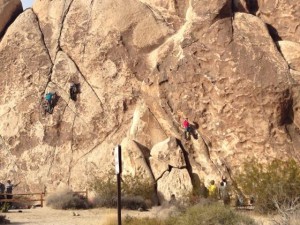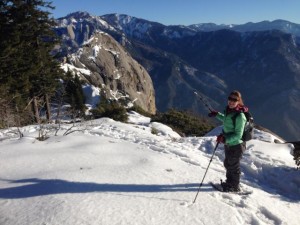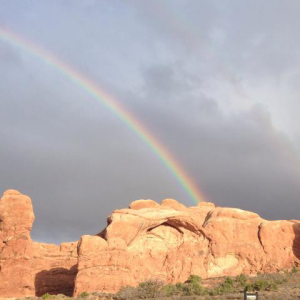
How would you like to travel to six of the country’s most famous National Parks for your senior thesis?
My friend Eve Barnett, a senior in the politics department, did just that. Eve, who also leads Outdoor Action trips and rock-climbs with the Princeton Climbing Team, found a way to combine her academic training with her love of the outdoors. Her thesis focuses on how the Park Service addresses a controversial issue within the climbing community: fixed anchors, metal bolts pushed into a cliff face for climbers to clip into. Should they be allowed in National Parks because they increase access, or banned because they’re a permanent change to the rock face? I sat down with Eve to learn more about her research journey.
How did you decide on a research topic? Was it related to your previous independent work?
It was totally unrelated! My fall JP was about international ocean conservation commissions, and my spring JP was about the different political experiences of high-income and low-income college students. I asked my thesis adviser what he thought about continuing with the college student project, but he recognized that it wasn’t really my project since it was a small portion of a professor’s ongoing research. He told me he believed my thesis topic should be something I have ownership of. So I started thinking, what do I love?
I love rock climbing. Could I combine that with political science? I didn’t know how to do that, so I just cold-called the Access Fund, which is the nation’s leading climbing conservancy lobby group. I introduced myself and said “Do you have any questions you need answered, that I can maybe answer with my thesis?” And they said, in fact we do – should fixed anchors be allowed in parks? Six parks are doing it differently and we don’t know why. So that became my question: should they be allowed, and why?

How did you find an adviser for your thesis?
I knew the adviser makes the thesis, so I wanted to work with an adviser who I really like. I had worked with Professor Achen for a class about the Tea Party, and thought that he pushed me and made me think in an interesting way. My topic isn’t really related to his work, but it’s a good match – he’s always believed in me. I got really lucky.
What obstacles did you face during the research process?
It felt daunting thinking about the idea. I wasn’t really sure I could pursue a personal passion in an academic way — because I’m not writing a thesis about climbing, I’m writing about political science. But the individual latitude that parks get in making policy on things like fixed anchors is an interesting bureaucratic question. If the TSA or the Postal Service gave that much latitude, they’d fail pretty quickly. So my thesis eventually morphed into a case study as to how the Park Service operates and why it hasn’t failed.
“If this was easy to write, it wouldn’t be worth writing.”
What challenges did you overcome in the writing process?
Once I had done the research, it was hard to figure out how to organize it. It didn’t help that while doing the research, I hardly knew what I would be asking – my thesis question changed with almost every interview. I wasn’t able to come up with a structure until I had finished all my research, and eventually I had 40 different hour-long interviews to try to put together.
My adviser told me that writing a thesis is just diving into the deep end, and you don’t know if you’re going to find the right approach. He said “if this was easy to write, it wouldn’t be worth writing.” So I just started writing.
The hardest part was page 6. The first few pages are exciting, but by the time you get to page 6, you’ve been writing for three hours, and you don’t know how you’re going to reach 100 pages. But I started doing a chapter a week, where I plan for the first half and then just write for the second half of the week, and a month later I have 77 pages.

Has your research influenced your post graduation plans?
It has given me insight into what I want to do. (Maybe!) I’m joining the Park Service because it’s what I wrote about for my thesis. I wouldn’t have realized my dream is to be a wilderness ranger.
I joke that my thesis is my twin, or my shadow: it’s always there, and sometimes it’s annoying, but it’s something I really love. I’ll be sad to turn it in. If I’m going to be sad to turn it in, if I’m calling my thesis something that I really love, maybe I love to do research. I could see myself going to grad school for this.
~~~
Though her journey is exotic in its setting and full of unexpected serendipity, the broad strokes of Eve’s research journey are not uncommon. As undergraduate researchers we are uniquely positioned to pair our passions with rigorous academic analysis. And with a project like that, what we find out about the world around us may be overshadowed by what we learn about ourselves.
— Bennett McIntosh, Natural Sciences Correspondent

